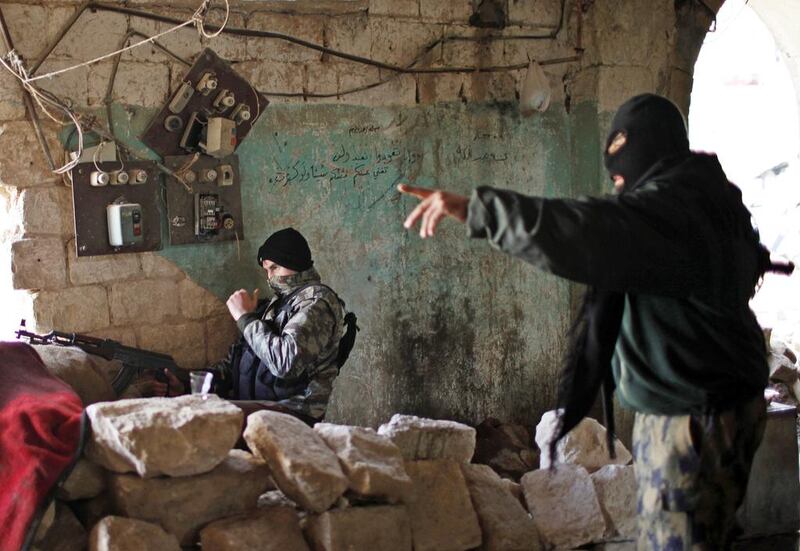A week ago, the United States was on track to launch a campaign against Jabhat Fateh Al Sham, formerly Jabhat Al Nusra, in collaboration with Russia. But the deal has so far led to further division between the two countries and deeper solidarity with JFS from a diverse range of Syrian rebel forces and individuals.
Diplomatic tension between Washington and Moscow escalated on the weekend due to Russia’s failure to help aid convoys enter Aleppo. The US gave Russia until Monday to ensure the delivery of aid. Tension peaked after the US-led anti-ISIL coalition killed “by mistake” dozens of Syrian military forces in Deir Ezzor on Saturday.
Meanwhile, JFS – the focus of the latest US effort in Syria – appears to be gaining in some quarters. On the day that the US-Russian diplomatic spat reached a high point, the group’s leader, Abu Muhammad Al Jolani, appeared on Al Jazeera to talk about the international plan to fight his group.
For the first time since its rebranding on July 28, JFS’s tone and conduct seem to be changing amid a noticeable increase in solidarity among various forces in Syria, even as many doubt the group’s true disengagement from Al Qaeda.
Al Jolani highlighted issues to which many in rebel-held areas relate and which jihadist groups often neglect. One was the lack of education for thousands of children in rebel areas, which he said would cause those children to engage in crimes as they grow up. He also suggested an armed struggle would continue “until the toppling of the regime”.
Another interesting aspect of his remarks was his favourable tone towards the regional order. He referred to the resistance in Syria as a cornerstone for Arab Sunnis’ opposition to Iranian hegemony in the region, referring to certain countries by their official name, in contrast to the pejorative way his former “emir”, Al Qaeda leader Ayman Al Zawahiri, refers to them.
Recent messaging by JFS echoes that tone. The group released a letter of gratitude to rebel organisations that opposed the US-Russian plan to target it. The statement contradicted a fatwa issued only days before by Abu Muhammad Al Maqdisi, a notorious Al Qaeda ideologue who said rebels who co-operated with Turkey against ISIL in northern Syria were apostates. The way the statement was worded specifically targeted the takfiri attitude within Syria.
Whether JFS has truly split from Al Qaeda is still in question, but many in Syria now view it differently. More importantly, the American plan to target the group is pushing more people to support it, since the US-Russian deal is seen as aiding the regime of Bashar Al Assad.
Even as Washington doubts the group’s disengagement from Al Qaeda – as do many, including this author – the US cannot pretend that nothing has happened since July 28, when the group recast itself as a Syrian group committed to a Syrian cause. In this sense, JFS outplayed the US by its rebranding, and the change in perception requires a new way of dealing with it, regardless of whether American officials believe the group has truly changed its ideology and allegiance.
For many ordinary Syrians, fairly or not, the US targets JFS not because of its ideology but because it is emerging as a powerful rebel force in Syria. The group, they say, has demonstrated time and again that it is committed to the fight against the regime and not to the forceful implementation of sharia, as ISIL did. It then announced publicly, through its leader in May last year, that the group was forbidden by Al Qaeda to use Syria to launch attacks in the West. Finally, it abandoned the name of Al Qaeda in its public discourse.
On top of these concessions, America’s alliance with Russia to target JFS has given the impression that the US is simply not interested. Increased military interdependency between the rebels and JFS, especially in critical areas such as Aleppo and Idlib, means US action against JFS now will be viewed more than ever before as help to the regime – especially as it happens in cahoots with the regime’s backers.
Washington is undoubtedly making a policy mistake in the way it seeks to fight JFS. But it is also sending the wrong messages. On Saturday, for example, it apologised and offered compensation to the regime for the wrongful targeting of regime soldiers in Deir Ezzor. While Russia clearly did not make good on its promises in accordance with the deal, the US still desperately clings to the agreement without showing the ability to ensure compliance.
Even if the deal holds, the war against JFS has serious limitations. Air strikes are unlikely to weaken the group without the use of ground forces. The key to the plan’s success was the prospect of the Syrian rebels co-operating with the US to weaken JFS, or at least strengthen the moderate forces at its expense.
But the way the US has conducted itself since the deal was agreed a week ago is not promising. On the contrary, JFS seems poised to gain from the botched agreement.
Hassan Hassan is a resident fellow at the Tahrir Institute for Middle East Policy and co-author of ISIS: Inside the Army of Terror
On Twitter: @hxhassan





